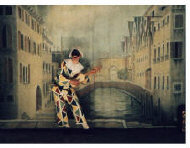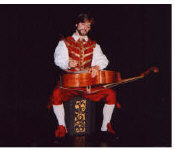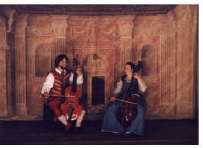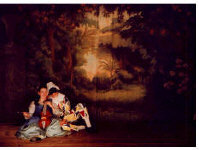|
|
"If music be the food of love..." This is both the beginning of a
Shakespearean comedy set by Henry Purcell, as well as the "golden"
thread that runs through the chamber-music/dance-theater program of TEATRO ARCIMBOLDO, an ensemble based in Basel, Switzerland.
In four scenes, the magic of the
Golden Age comes to life through the combination of theater, music, dance, and
elements of commedia dell'arte: Fileno has to disguise himself as Vespone to
ultimately win his beloved Lilla; Captain Hume has to bring to bear all his
"English humour" to not lose control of his violistic and amorous
escapades; and the dancing shepherdess Lisette also finds happiness in the end,
in spite of her encounter with the sinister Doctor Marais.
Exhilaratingly staged, this "commedia"
is presented by TEATRO ARCIMBOLDO exploiting all the possibilities of Baroque
theatercraft. Love duets, outbreaks of despair, masquerades, dances, and painted
stage-backdrops modelled on old illustrations - a wonderful feast for eyes and
ears, which carries the listeners away to the world of the Renaissance and the
Baroque.
Program:
Scene 1: "Ghirlande amorose"
|
Music: C. Monteverdi, G. Caccini, G.F. Sances,
G. Gastoldi
Text: Molière
Characters: Fileno, Vespone, Lilla, Colombina, Arlecchino
 Fileno sings of his love for Lilla ("Si
dolce è il tormento"), who he thinks is only interested in Vespone,
an old and wealthy bachelor. Lilla, however, reciprocates Fileno's love
("Dolcissimo
sospiro"), but wants to make him jealous with pretended affection for
Vespone. To put Lilla's faithfulness to the test, Fileno disguises himself as
Vespone, but in spite of all his seductive skills all he gets from Lilla is a
slap in the face ("Dialogho amoroso"). When Fileno finally
discloses his identity, he and Lilla confess their love to one another. During
the festivities that follow ("Balletti"), Lilla notices that
Colombina also has her eyes on Fileno - much to Arlecchino's dismay. And so
Lilla must take recourse to Cupid's weapons to bring Fileno back to his senses. Fileno sings of his love for Lilla ("Si
dolce è il tormento"), who he thinks is only interested in Vespone,
an old and wealthy bachelor. Lilla, however, reciprocates Fileno's love
("Dolcissimo
sospiro"), but wants to make him jealous with pretended affection for
Vespone. To put Lilla's faithfulness to the test, Fileno disguises himself as
Vespone, but in spite of all his seductive skills all he gets from Lilla is a
slap in the face ("Dialogho amoroso"). When Fileno finally
discloses his identity, he and Lilla confess their love to one another. During
the festivities that follow ("Balletti"), Lilla notices that
Colombina also has her eyes on Fileno - much to Arlecchino's dismay. And so
Lilla must take recourse to Cupid's weapons to bring Fileno back to his senses.
|
|
|
|
|
Scene 2: "A Midsummer Night's Dream"
|
Music: R. Jones, H. Purcell
Text: W. Shakespeare
Characters: Captain Hume, Mistress Molly Tittles, Arlecchino
 While writing a love letter to Molly Tittles
in which he compares his love to the flight of Icarus, who came too close to
the
sun and fell into the sea with burned wings ("Love wing'd my hopes"),
Captain Hume falls asleep. The object of his affections appears in a dream to
comfort him ("If music be the food of love") and to encourage
his courtship. Awakening, Hume remembers the dream ("My thought this
other night") and orders his servant Arlecchino to deliver the letter
secretly, without letting Mrs. Hume know about it. While writing a love letter to Molly Tittles
in which he compares his love to the flight of Icarus, who came too close to
the
sun and fell into the sea with burned wings ("Love wing'd my hopes"),
Captain Hume falls asleep. The object of his affections appears in a dream to
comfort him ("If music be the food of love") and to encourage
his courtship. Awakening, Hume remembers the dream ("My thought this
other night") and orders his servant Arlecchino to deliver the letter
secretly, without letting Mrs. Hume know about it.
|
***** Intermission *****
Scene 3: "English humour"
|
Music: Thomas Ford, Tobias Hume
Characters: Captain Hume, Mrs. Hume, Molly Tittles
 When Hume flirts with Molly Tittles in the
presence of his wife ("Shut not sweet breast"), Mrs. Humes
reaches angrily for a
pistol
and shoots her rival. Hume, as a former soldier, remains calm ("Soldier's
Song"), yet does not respond to his wife's attempt at reconciliation.
Ultimately, he does give in, but exploits the situation so shamelessly that
Mrs. Hume flees in the face of his brazenness. After he has now been left by
both women, he seeks comfort in "Tobacco". As Hume also has
gone, Molly wakes up a last time and bewails her fate ("What greater
griefe"). When Hume flirts with Molly Tittles in the
presence of his wife ("Shut not sweet breast"), Mrs. Humes
reaches angrily for a
pistol
and shoots her rival. Hume, as a former soldier, remains calm ("Soldier's
Song"), yet does not respond to his wife's attempt at reconciliation.
Ultimately, he does give in, but exploits the situation so shamelessly that
Mrs. Hume flees in the face of his brazenness. After he has now been left by
both women, he seeks comfort in "Tobacco". As Hume also has
gone, Molly wakes up a last time and bewails her fate ("What greater
griefe").
|
Scene 4: "Fête Champèstre"
|
Music: Marin Marais, Michel Pignolet de
Monteclair
Characters: Arlecchino, Lisette, Doctor Marais, Tircis
 While Arlecchino dances a "Chacoon
pour Harlequin", the shepherdess Lisette appears, in whom he
immediately falls in love. Only after much coaxing, however, does she consent
to dance a
sarabande with him ("Les folies d'Espagne"). Night falls
gradually. As it becomes darker and darker, the sinister Doctor Marais appears.
The cowardly Arlecchino flees, and, after the last wild variation, Lisette
falls to the ground as if dead. The Doctor can save Lisette's life in the
operation that now follows ("Le Tableau de l'Operation de la
Taille"), but she only awakes from her swoon when she is discovered
by Tircis, who is picking flowers ("Les délices champestres").
Arlecchino joins them, and together they celebrate Lisette's successful
convalescence with song and dance. While Arlecchino dances a "Chacoon
pour Harlequin", the shepherdess Lisette appears, in whom he
immediately falls in love. Only after much coaxing, however, does she consent
to dance a
sarabande with him ("Les folies d'Espagne"). Night falls
gradually. As it becomes darker and darker, the sinister Doctor Marais appears.
The cowardly Arlecchino flees, and, after the last wild variation, Lisette
falls to the ground as if dead. The Doctor can save Lisette's life in the
operation that now follows ("Le Tableau de l'Operation de la
Taille"), but she only awakes from her swoon when she is discovered
by Tircis, who is picking flowers ("Les délices champestres").
Arlecchino joins them, and together they celebrate Lisette's successful
convalescence with song and dance.
|
Cast:
TEATRO ARCIMBOLDO, Basel
Direction: Thilo Hirsch
Scenery/Costumes:
Michael Hein (Theater Basel)
Atelier für historische Kostüme Meilen
Sponsors:
|
This production was
supported by the following institutions:
-
Jürg George Bürki Stiftung
-
Sophie und Karl Binding Stiftung
-
Stiftung zur Förderung der darbietenden Künste
-
Jubiläumsstiftung der Zürich Versicherungs-Gruppe
-
Emil Richterich-Beck Stiftung
-
Ernst Göhner Stiftung
|
|
|
 Fileno sings of his love for Lilla ("Si
dolce è il tormento"), who he thinks is only interested in Vespone,
an old and wealthy bachelor. Lilla, however, reciprocates Fileno's love
("Dolcissimo
sospiro"), but wants to make him jealous with pretended affection for
Vespone. To put Lilla's faithfulness to the test, Fileno disguises himself as
Vespone, but in spite of all his seductive skills all he gets from Lilla is a
slap in the face ("Dialogho amoroso"). When Fileno finally
discloses his identity, he and Lilla confess their love to one another. During
the festivities that follow ("Balletti"), Lilla notices that
Colombina also has her eyes on Fileno - much to Arlecchino's dismay. And so
Lilla must take recourse to Cupid's weapons to bring Fileno back to his senses.
Fileno sings of his love for Lilla ("Si
dolce è il tormento"), who he thinks is only interested in Vespone,
an old and wealthy bachelor. Lilla, however, reciprocates Fileno's love
("Dolcissimo
sospiro"), but wants to make him jealous with pretended affection for
Vespone. To put Lilla's faithfulness to the test, Fileno disguises himself as
Vespone, but in spite of all his seductive skills all he gets from Lilla is a
slap in the face ("Dialogho amoroso"). When Fileno finally
discloses his identity, he and Lilla confess their love to one another. During
the festivities that follow ("Balletti"), Lilla notices that
Colombina also has her eyes on Fileno - much to Arlecchino's dismay. And so
Lilla must take recourse to Cupid's weapons to bring Fileno back to his senses. While writing a love letter to Molly Tittles
in which he compares his love to the flight of Icarus, who came too close to
the
sun and fell into the sea with burned wings ("Love wing'd my hopes"),
Captain Hume falls asleep. The object of his affections appears in a dream to
comfort him ("If music be the food of love") and to encourage
his courtship. Awakening, Hume remembers the dream ("My thought this
other night") and orders his servant Arlecchino to deliver the letter
secretly, without letting Mrs. Hume know about it.
While writing a love letter to Molly Tittles
in which he compares his love to the flight of Icarus, who came too close to
the
sun and fell into the sea with burned wings ("Love wing'd my hopes"),
Captain Hume falls asleep. The object of his affections appears in a dream to
comfort him ("If music be the food of love") and to encourage
his courtship. Awakening, Hume remembers the dream ("My thought this
other night") and orders his servant Arlecchino to deliver the letter
secretly, without letting Mrs. Hume know about it. When Hume flirts with Molly Tittles in the
presence of his wife ("Shut not sweet breast"), Mrs. Humes
reaches angrily for a
pistol
and shoots her rival. Hume, as a former soldier, remains calm ("Soldier's
Song"), yet does not respond to his wife's attempt at reconciliation.
Ultimately, he does give in, but exploits the situation so shamelessly that
Mrs. Hume flees in the face of his brazenness. After he has now been left by
both women, he seeks comfort in "Tobacco". As Hume also has
gone, Molly wakes up a last time and bewails her fate ("What greater
griefe").
When Hume flirts with Molly Tittles in the
presence of his wife ("Shut not sweet breast"), Mrs. Humes
reaches angrily for a
pistol
and shoots her rival. Hume, as a former soldier, remains calm ("Soldier's
Song"), yet does not respond to his wife's attempt at reconciliation.
Ultimately, he does give in, but exploits the situation so shamelessly that
Mrs. Hume flees in the face of his brazenness. After he has now been left by
both women, he seeks comfort in "Tobacco". As Hume also has
gone, Molly wakes up a last time and bewails her fate ("What greater
griefe"). While Arlecchino dances a "Chacoon
pour Harlequin", the shepherdess Lisette appears, in whom he
immediately falls in love. Only after much coaxing, however, does she consent
to dance a
sarabande with him ("Les folies d'Espagne"). Night falls
gradually. As it becomes darker and darker, the sinister Doctor Marais appears.
The cowardly Arlecchino flees, and, after the last wild variation, Lisette
falls to the ground as if dead. The Doctor can save Lisette's life in the
operation that now follows ("Le Tableau de l'Operation de la
Taille"), but she only awakes from her swoon when she is discovered
by Tircis, who is picking flowers ("Les délices champestres").
Arlecchino joins them, and together they celebrate Lisette's successful
convalescence with song and dance.
While Arlecchino dances a "Chacoon
pour Harlequin", the shepherdess Lisette appears, in whom he
immediately falls in love. Only after much coaxing, however, does she consent
to dance a
sarabande with him ("Les folies d'Espagne"). Night falls
gradually. As it becomes darker and darker, the sinister Doctor Marais appears.
The cowardly Arlecchino flees, and, after the last wild variation, Lisette
falls to the ground as if dead. The Doctor can save Lisette's life in the
operation that now follows ("Le Tableau de l'Operation de la
Taille"), but she only awakes from her swoon when she is discovered
by Tircis, who is picking flowers ("Les délices champestres").
Arlecchino joins them, and together they celebrate Lisette's successful
convalescence with song and dance.